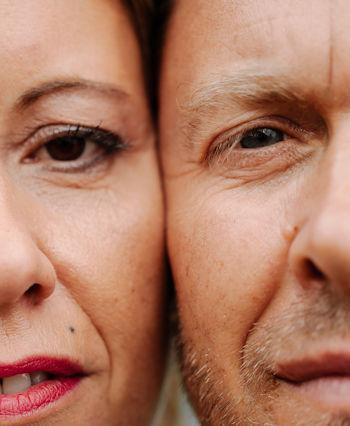No Enemy Images in Relationships–and Everywhere Else
I want to share the importance, and joy, of not having enemy images. So, what is an “enemy image”? How do you know when you have one? And what is the alternative?
The specific phrase “enemy image” was highlighted by the late psychologist Marshall Rosenberg, who was an international mediator as well as inventor of a methodology called Nonviolent Communication.
An enemy image exists whenever we think that our family member, spouse, sweetheart, co-worker, or political figure or leader or even a stranger is, at the moment or always, bad, crazy, or other similar judgments and condemnations. This generally arises when we observe the other person doing something that we cannot accept.
When negotiating in war zones, Marshall Rosenberg would find ways to get leaders of warring nations to understand the humanity of their opponents. In cases where leaders had suffered the loss of their own children due to the war, this was not easy, yet it did happen. By showing how to see the “other side” fully, he was often able to help resolve deeply-held anger and find a new peace for those in conflict.
In fact, our human brain is capable of judging and condemning every other human being on the planet, if it suits a need to make ourselves feel more right, more powerful, more wonderful. We all want to feel more wonderful!
So, what is the alternative to judging, whether explicitly or in more subtle ways? After all, in this world people do hurtful or insensitive things every day of every year. What are we supposed to do but feel judgmental for hurtful words and actions? How can we maintain an experience of peacefulness and empathy towards ourselves and others?
The only solution is more insight. Insight can reveal to us the reality that other people are in a lot of pain, as we may be. Insight also reveals that if we carry around anger and judgment, it burdens our own experience of life. When in pain, people are capable of and almost inevitably project that pain onto others and lash out, in explicit or well-disguised ways.
 In couples, we can often see this playing out in a variety of ways. One partner says to the other: “Why didn’t you take out the garbage? You never do your part of the housework; how can you be so lazy?” Or another example: “I can’t believe I gained weight, with your cooking!” (said with a chuckle, in a family gathering).
In couples, we can often see this playing out in a variety of ways. One partner says to the other: “Why didn’t you take out the garbage? You never do your part of the housework; how can you be so lazy?” Or another example: “I can’t believe I gained weight, with your cooking!” (said with a chuckle, in a family gathering).
There are also more subtle forms of judging those in our lives; the feeling may not even be expressed verbally, but it creates a gap between two people. For example, the thought: “He is careless about his appearance” rather than “He values a feeling of freedom with how he dresses and appears more than the impression he may make.” Notice that the second approach is not charged with (negative) feeling, but rather shows an interest in and curiousity about how the other person enjoys living their own life.
Micro-aggressions that are expressed occur when the individual does not know how to express their own need more effectively. For example, in the first case, the need might be more effectively expressed as: “I feel tired in the evening, dear, and I would really appreciate if we can work together better on some of the housework. It would help me a lot… is there a way that we can make that happen more easily?”
The benefit of this kind of communication is that it brings people closer together AND it is more likely (though not guaranteed) to get the desired effect.
So what is happening here? In the first, more aggressive example, the speaker is focusing on his/her own disappointment, and likely is tapping into a lifetime of disappointments from early in life, all of which is brought to the current moment. First it was parents or siblings or classmates, and now it is a spouse or romantic partner continuing to ignore one’s needs.
The spouse or partner takes on the role of enemy, the one that stands in the way of happiness, and only because “they” are selfish or lazy or mean. That is how one might think.
Through heart-centered introspection, it is possible for the same person to look at their own feelings of hurt, and their needs. Knowing that we are all carrying around some degree of wounds, the individual can express the hurt and the needs in a way that does not add more wounds to the other person.
When the mind is kinder, the speaker in the second example might say, “Wow, I gained some weight. I guess I am really enjoying the food you cook!” Or perhaps, “I gained some weight. Could we try to have more vegetables and less starch for meals, so I can get a handle on this? I need some help with this.” These expressions will definitely be easier to “digest” by the other person!
As psychotherapist Victor Frankl described it, between the stimulus and the response there is a moment of decision, and in that moment we determine our future direction. The more precise quote is “Between stimulus and response there is a space. In that space is our power to choose our response. In our response lies our growth and our freedom.”
Many leaders over thousands of years have tried to raise awareness that “Hatred does not cease through hatred at any time. Hatred ceases through love. This is an unalterable law.” Although “hatred” is a strong word, it is there in some form when we turn against people in our lives, even in small matters.
 When we can be vulnerable and kind in our own experience of self, and we can see the other person fully, we can genuinely express kindness with the people in our lives, including in our thoughts about those we hear about in the news from a distance who through blindness cause much pain to others and to themselves.
When we can be vulnerable and kind in our own experience of self, and we can see the other person fully, we can genuinely express kindness with the people in our lives, including in our thoughts about those we hear about in the news from a distance who through blindness cause much pain to others and to themselves.
We can work to promote more peace and connection in the world, and speak up for what is productive, but we cannot do so very effectively if we harbor enemy images in our hearts and minds. Life is too short to carry around the burden of enemy images, whether we invigorate those images due to others’ badly performed housework or cooking, or due to their starting wars, or due to anything in between.
There is an alternative, and using that alternative of compassionate awareness as a basis for words and action will make for more peace in relationships, on the planet, and in our own hearts and minds.
